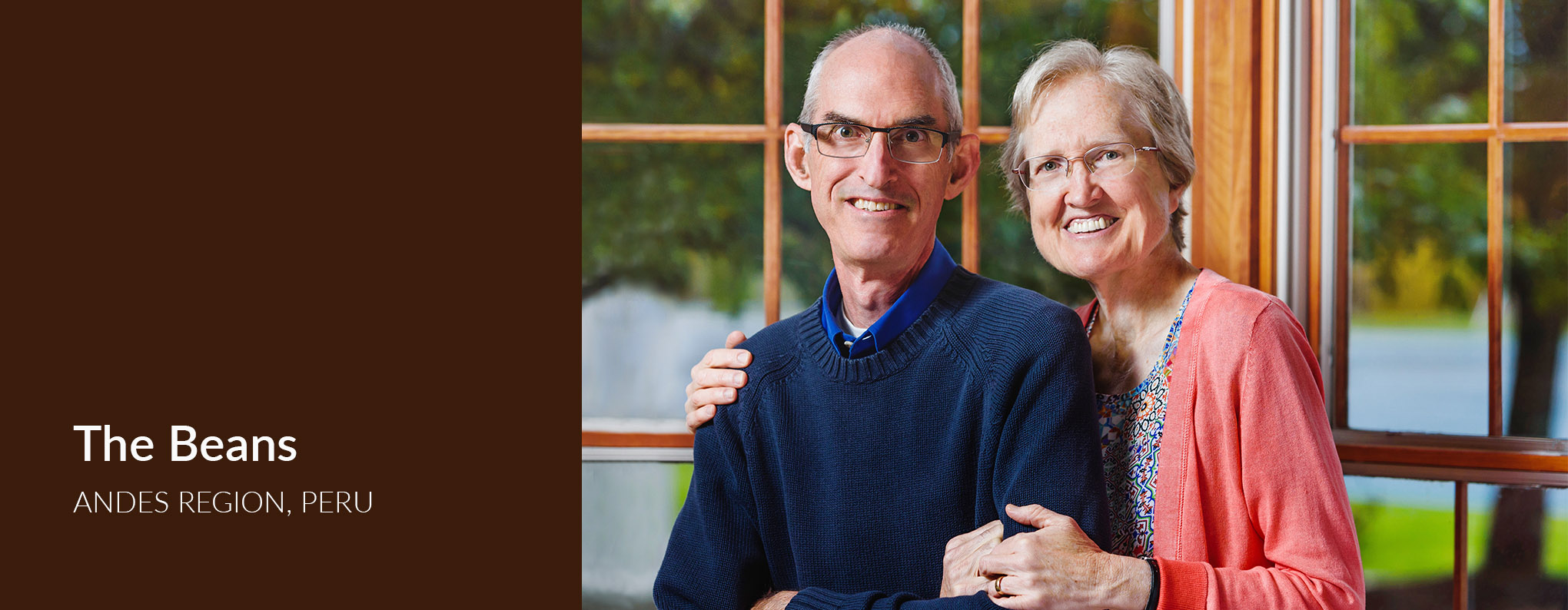
The Bean Family
Recent Blogposts
-
Beans'Talk February 2019
Download the February 2019 Beans'Talk with photos here.
SHOUT from the mountaintops!
God has done in it! Though YOU—many, many, many of you—he has provided all the funding needed to print these Bibles.
Teamwork in action
This has truly been an example of teamwork; the body of Christ working together.
*Our personal partners outdid themselves, quite a few giving multiple times. THANK YOU!
*Numerous Wycliffe colleagues also gave. THANK YOU!
*Some of them let their partners know of the need. Funds came in from all parts of the country, and outside of the country as well. THANK YOU!
*The maintenance crew employed at Wycliffe’s headquarters in Orlando has been praying for this need and also gave to help. THANK YOU!
*Family members helped and also raised awareness of the need, bringing others in. THANK YOU!
*Churches literally from coast to coast (California to Florida and many places in between) took up special offerings to help publish these Bibles. THANK YOU!
*There were a number of anonymous gifts given by whoever you are. THANK YOU!
-
Beans'Talk January 2019
Babies
Who doesn’t love interacting with a baby? Our youngest grandson is in the area over Christmas and he brings smiles to all faces. Babies are so non-threatening. It reminds us of our first year living in a Quechua village. We were scary, but baby Emily was an attention grabber. People weren’t afraid of the helpless little blond baby.
Not scary
(thanks to Phillip Yancey in Meet the Bible, p. 405) Ever noticed in the Bible how often an angel has to start by saying “Don’t be afraid”? It is a scary thing to meet the supernatural face to face.
So, what did God do when he came to earth? He appeared in the least threatening way possible. What could be less scary than a baby? A newborn baby, at that.
-
Beans'Talk December 2018
Download the December 2019 Beans'Talk with photos.
Looking back
Our road trip came to an end yesterday. How good to finally reconnect with partners in Wisconsin and Illinois. It had been too long!
While on the road I needed to look back through some old reports. In doing so, I found some early reactions to the Old Testament from the Quechua translators themselves. Here are two views of God—both true.
A God who judges
Wilmer commented early on that he had always wondered why God seemed so quick to judge people in the Old Testament. But while translating, he understood that God held people accountable for their choices and actions. Judgment was due to people’s own rebellion, not God’s whim.
His observation touches on a Quechua cultural presupposition that God surely wouldn’t judge an individual for his actions because, after all, the person is just living the way God made him. Wilmer realized more sharply that indeed God does hold people responsible.
-
Missions Night Audio Now Online!
Would you like to know more about Mark & Patti Bean and their ministry in Peru with Wycliffe Bible Translators?
Mark & Patti's presentation given at the Missions Night Dinner on October 26 at Parkside Church is now available!
-
Beans'talk November 2018
Download the November 2018 Beans'talk with photos.
Fresh bread
There are not many things that smell as good as freshly baked bread. One of the treats of living in a Peruvian town is hot, fresh bread twice a day. The picture above is at the baker’s just a block from where we held translation workshops in Huaraz. We would stand right where this shot was taken and either get fresh bread from the table where it is placed after taking it from the oven or wait for the next batch to come out. Talk about fresh!
A treat in the village
In contrast to town, for those who live out in a village, fresh bread is a special treat. It is something that appears just for festive occasions—like for the anniversary of the village. Another occasion for bread is All Saints’ Day on November 1st when families prepare a special meal for the deceased. Often there is just one lone, large mud oven in a village that is heated with firewood to make bread for everyone. In Quechua, the bread in the village is called “thrown bread” because of the way a handful of dough is thrown onto a metal sheet that’s been hammered flat from a large, empty tin of oil. They place the metal sheets with the lumps of dough in the oven and out comes warm, chewy, wholesome bread. Mmm! We miss that bread!
-
Event
Missions Night Dinner with Mark & Patti Bean
Location: The Venue at Parkside Church
Start Time: Fri 26, Oct. 2018, 9:30 p.m.
End Time: Fri 19, Oct. 2018, 11:30 p.m.
Join us on October 26 at 6:30 pm for dinner, followed by a presentation from Parkside missionaries, Mark & Patti Bean. Mark and Patti serve with Wycliffe Bible Translators and are in the process of having six Bibles printed in Quechua dialects of central Peru.
Cost is $10.00 per person. Register online below or pick up a registration form from any info center. A registration table will also be outside the Venue on Sunday morning, Oct. 21.
-
Beans'talk October 2018
Download the October 2018 Beans'Talk with photos here.
Spelling bees, anyone?
The Quechua Bibles that are waiting to be printed use a slightly different spelling system than the previously published New Testaments. So, our Quechua co-workers have made it a point to get out and help prepare people by organizing reading and writing practice. A number of churches in the Huánuco area have hosted series of classes. Men and women, young and old, on white boards, blackboards and pieces of paper practice away. Everywhere the big question is: When will our Bibles arrive?
What an example!
In another part of the mountains, Quechua co-workers challenged a group of pastors to pray for God to provide the funds needed to publish their Quechua Bible. The next day pastor Mauricio and his wife gave a donation of $300. To put this in context, this is roughly equivalent to a month’s pay for someone who earns a regular salary, which pastor Mauricio does not. Instead, he and his wife had frugally saved up from their sales of extra farm produce. We aren’t the only ones re-telling Mauricio’s story. You may have already heard it. It gives a clue to how much it means to our Quechua friends that they have a complete copy of God's Word!
-
Beans'Talk May 2018
Download the May 2018 Beans'Talk with photos here.
Five down and one to go!
Today as you read this, the fifth Quechua Bible is almost through the final layout process. Then, there’s just one more Bible to go.
New Quechua websites ask for help
During the past month some of our Quechua partners had the opportunity to attend a workshop on developing websites. Help! came a message. Help us update our materials so they can be downloaded.
Over the years as the orthography (spelling system) has changed, not all books and materials kept up with all the changes back and forth. For example, we started using the letter k to represent the hard c sound. Then, we moved to c and qu to match what kids learn in the Spanish speaking schools. Currently, we’re back to using k in Quechua materials to match the government’s foray into promoting Quechua.
So, Mark found himself re-working the series of fox stories along with other stories we haven’t touched in years. All one has to do is tell the punch line of the story illustrated here and everyone laughs! Hang on, guys!
Hurray for people working to make these materials more accessible to Quechua speakers. These websites will eventually contain links for people to access Scripture in their own language. Another hurrah!
-
April 2018 Beans'Talk
Download the April 2018 Beans'Talk with photo here.
Strike up the band!
Ta-daa! The proofs have been checked and the first of the six Bibles has been turned over for final layout. Four others are waiting in the wings for their turn. Just one group wants a bit more time before they turn theirs over. This is a major milestone! Celebrate with us and all the team! And you know, the team includes all of you who pray, give, and encourage us along the way. Through many people, God has graciously helped us get to this point.
Totaling it up
We always knew that translating the Bible into six related Quechua languages was a big job. Recently, however, we counted up some statistics to get a better idea.
* In the process of translating for six Bibles, we worked intensely and multiple times on 186,174 verses (31,029 verses per Bible). There was the initial translation followed by an edit, reading to people in communities to make sure that everything was understandable, re-editing, reading through on the computer, re-editing, reading aloud, re-editing, etc. And then, finally, reading through the proofs.
-
Beans'Talk March 2018
Download Beans'Talk March 2018 with photos here.
Extra help
As the Quechua teams read through the proofs, Mark asked Oscar, a native Quechua speaker and fellow missionary, if he would like to read some as well. After Oscar read a couple books and had tasted how sweet the translation is in his own language, he offered to read through the entire Bible.
It’s so encouraging to read Oscar’s comments when he sends back a file. Oscar is not new to the Bible. So, it means a lot to have him say:
What a beautiful translation, brother! I’m not just reading to check the translation, I’m reading to worship the One who confused all the languages in the first place.
I’m reliving the life of Paul [as I read this].
And, God is really glorified in what you are doing, Mark.
